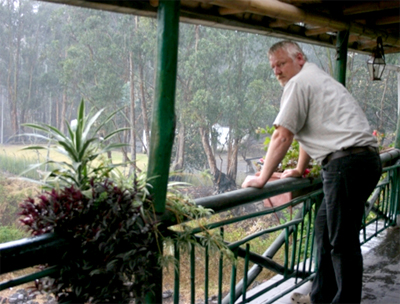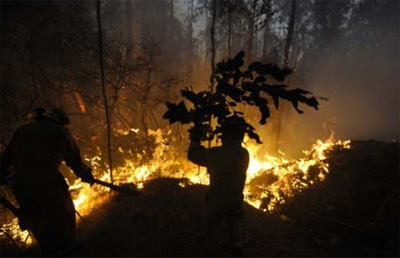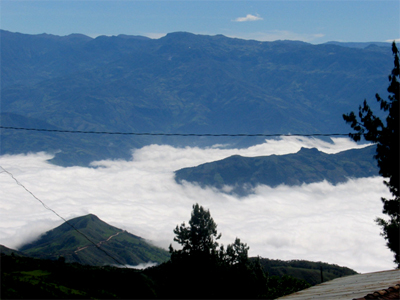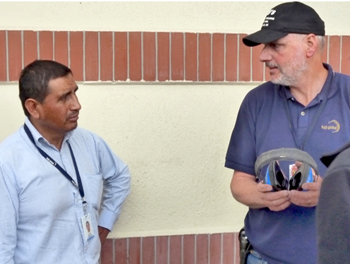 |
| Hermann Schirmacher breathes a sigh of relief the afternoon of Friday, Sept. 21, after rain falls at his home east of Quito. However, it wasn't enough rain to significantly reduce the fire threat. |
(Sept. 21, 2012 - by Ralph Kurtenbach) With suitcases packed, Hermann and Irene Schirmacher are planning no family vacation, but instead an evacuation if necessary.
Wildfires are the latest threat to several provinces of Ecuador, including Pichincha province where the Schirmachers serve as missionaries with HCJB Global. In the greater Quito area, firefighters have fought 2,053 forest fires (25 per day) since the dry season began in June with 1,154 hectares (2,850 acres) destroyed by flames.
"We've seen a marked decrease in rainfall (even for the dry season)," said Hernán Parreño of the Instituto Nacional de Meteorología e Hidrología (National Institute of Meteorology and Hydrology) on Sept. 18. "We have had 25 consecutive days without rain. Besides that, humidity is very low."Clouds moved into Quito the afternoon of Friday, Sept. 21, and the area got a sprinkle. Rain also fell on the Schirmachers' neighborhood east of Quito. "There was smoke, fire and helicopters flying over our house all day long as the fire in our neighborhood continued," Hermann said Friday evening. "But what a blessing, it rained!" While the rain was a welcome relief, a lot more is needed to significantly reduce the fire threat.
The Schirmachers live in Cumbayá (pronounced like a popular campfire chorus), a short drive from the pastures and fields that formerly served as Radio Station HCJB's international transmitter site at Pifo. Nearby, construction continues in the final stages of preparing the runways and control tower of Quito's new international airport.
On Sept. 5 the Schirmachers learned of a fire threatening their home when a neighbor called to offer them refuge. Hermann quickly headed home but was delayed as traffic glutted the 1,340-meter (three-quarter-mile) long Guayasamín Tunnel connecting Quito with the adjacent valley.
 |
| Firemen tackle recent fires in Ecuador. Photo courtesy of El Telégrafo. |
At a sector known as Chilla (near Machala) in the southern Ecuadorian province of El Oro, programming from 94.7 HCJB-2 (La Conexión) has been silenced since Thursday, Sept. 6, when a wildfire destroyed cables that serviced the station's FM repeater as well as other broadcasting facilities.
"We have a power cable coming through the trees from a power pole with a transformer," said HCJB Global engineer Tim Zook. "That would have been the most vulnerable. We also have cables coming out of the (transmitter) building at a high level-over six feet-and then heading up a tower. Those could possibly be burned, but it would take a big fire to [destroy them]."
On Tuesday, Sept. 11, media reports indicated that the Chilla fire was then uncontrolled due to high winds, difficult terrain and lack of rain all contributing to a disaster declaration by the Emergency Operations Committee (COE).
 |
| A panoramic view from the mountaintop Chilla FM transmitter near Machala with a signal that normally reaches as far north as Guayaquil and south to northern Peru. |
"We try to keep the brush cut down and away from the transmitter sites so that when it does burn it doesn't create problems," Zook explained. "But we weren't prepared in Machala (Chilla) up on the mountain. We didn't have any way to remove brush, and the fire went through there and burned cables, so it's off the air."
The newspaper reported that the conflagration started at the Huiracocha antenna site and spread, destroying some 1,500 hectares (3,700 acres) of forest land despite responses by fire crews from El Oro, Azuay, Guayas, Loja and Los Ríos provinces. The Chilla fire was finally controlled by Sept. 13, and electrical crews entered to begin work.
The Chilla repeater's 1,000-watt transmitter atop Mount Huiracocha at an altitude of about 3,200 meters (10,500 feet) normally sends a signal to southern coastal Ecuador as well as northern Peru. There is no backup transmitter for the repeater, and Zook and Pumisacho anticipate traveling to El Oro on Sept. 23-28 to reconnect the site and restore the signal to the airwaves.
 |
| Milton Pumisacho (left) and Tim Zook discuss plans to put the fire-damaged Chilla station back on the air. |
In a Sept. 12 Facebook post, as fires burned on two mountainsides surrounding Quito, Jeff Ingram observed, "I have had ash from wildfires fall on my head in two different cities on two different continents this year."
As part of his responsibilities as the mission's member care director, Ingram and his wife, Nancy, spent most of this month ministering to missionaries in Ecuador, returning home to Colorado on Friday, Sept. 21. For two days earlier this summer (June 27-28), the HCJB Global Ministry Service Center in Colorado Springs was closed as a wildfire blazed uncontrolled west of the office. Amid that fire's destruction, 346 homes were destroyed. Four of the mission's staff members were evacuated, but none of their homes were damaged. That blaze-the Waldo Canyon Fire-was fully contained by mid-July.
Update posted on Sept. 27:
Recent precipitation ended seven fires that Quito-area firefighters were keeping under control, according to a statement released by Quito authorities on Friday, Sept. 21. The Schirmacher family unpacked the suitcases they've had ready at their home in Cumbayá for a possible evacuation.However, it was a short-lived respite. "Eleven Fires Over the Weekend in Quito" offered a headline on Saturday, Sept. 22. Then about noon Sunday, fire broke out at in the Tanda sector of Cumbayá, according to El Comercio.
A similar cycle had occurred a few days earlier in south Quito (Chillogallo) where firemen, soldiers and police had battled burning grasses and trees for several hours on Wednesday, Sept. 19, until smoke and fog made the work too dangerous. They quit with the blaze 70-percent contained, Fire Chief Washington Arce told El Comercio.
Rain also helped extinguish a fire at San Rafael, but the following day saw the Chillogallo fire reactivate, prompting firefighters to return. Schools suspended classes, and with help from helicopters, the firemen controlled the blaze.
According to the Instituto Nacional de Meteorología e Hydrología, rains will continue to fall in 30- to 45-minute chubascos (heavy showers) as the western part of Ecuador transitions from dry season to rainy season. There were afternoon rains in Quito on two consecutive days (Monday-Tuesday, Sept. 24-25). The average annual rainfall in Quito is 40 inches.
Sources: HCJB Global, El Comercio
